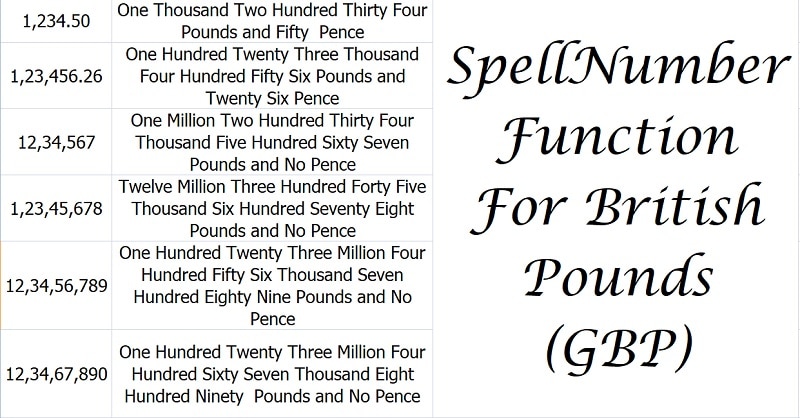
SpellNumber Great Britain Pound is an Excel function which is created using VBA Programming. It displays a given number in words with Great Britain Pounds (GBP).
SpellNumber Function is not inbuilt in excel. You need to create this function manually in every workbook using the VBA coding.
In simple terms, it will convert a numeric value of GBP into English words.
For example:
$ 2,345.50 = “Dollar Two Thousand Three Hundred Forty-Five and Fifty Cents” usingSpellNumber Function
GBP 2,345.50 = ” Two Thousand Three Hundred Forty-Five Pounds and Fifty Pence ” using the SpellNumber Great Britain Pound Function.
We have made minor changes to the code provided by Microsoft to derive the required result.
You can also check spellnumber function for other currencies: SpellNumber Without Currency, SpellNumber for UAE Dirhams, SpellNumber Saudi Riyals & SpellNumber Indian Rupees.
Below given is the complete step by step process to create this SpellNumber Great Britain Pound Function using the VBA.
How To Create SpellNumber GBP Function
1: Open a workbook.
2: Click “Developer Tab”.
3: Click “Visual Basic”
4: Click “Insert” in the File Menu.
5: Click “Module” as shown below:
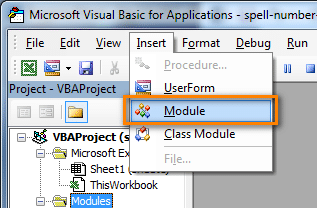
A new module sheet will open.
5: Copy and Paste the Code given below into the Module sheet.
Code for SpellNumber Function for GBP (Great Britain Pound)
This file contains hidden or bidirectional Unicode text that may be interpreted or compiled differently than what appears below. To review, open the file in an editor that reveals hidden Unicode characters.
Learn more about bidirectional Unicode characters
| Option Explicit | |
| 'Main Function www.ExcelDataPro.com | |
| Function SpellNumberEDP(ByVal MyNumber, Optional MyCurrency As String = "") | |
| Dim Dollars, cents, Temp | |
| Dim DecimalPlace, Count | |
| ReDim Place(9) As String | |
| Place(2) = " Thousand " | |
| Place(3) = " Million " | |
| Place(4) = " Billion " | |
| Place(5) = " Trillion " | |
| ' String representation of amount. | |
| MyNumber = Trim(Str(MyNumber)) | |
| ' Position of decimal place 0 if none. | |
| DecimalPlace = InStr(MyNumber, ".") | |
| ' Convert cents and set MyNumber to dollar amount. | |
| If DecimalPlace > 0 Then | |
| cents = GetTens(Left(Mid(MyNumber, DecimalPlace + 1) & _ | |
| "00", 2)) | |
| MyNumber = Trim(Left(MyNumber, DecimalPlace – 1)) | |
| End If | |
| Count = 1 | |
| Do While MyNumber <> "" | |
| Temp = GetHundreds(Right(MyNumber, 3)) | |
| If Temp <> "" Then Dollars = Temp & Place(Count) & Dollars | |
| If Len(MyNumber) > 3 Then | |
| MyNumber = Left(MyNumber, Len(MyNumber) – 3) | |
| Else | |
| MyNumber = "" | |
| End If | |
| Count = Count + 1 | |
| Loop | |
| Dim str_amount, str_amounts | |
| Dim str_cent, str_cents | |
| Select Case UCase(MyCurrency) | |
| Case "SAR" | |
| str_amount = "Riyal" | |
| str_amounts = "Riyals" | |
| str_cent = "Halala" | |
| str_cents = "Halalas" | |
| Case "AED" | |
| str_amount = "Dirham" | |
| str_amounts = "Dirhams" | |
| str_cent = "Fil" | |
| str_cents = "Fils" | |
| Case "GBP" | |
| str_amount = "Pound" | |
| str_amounts = "Pounds" | |
| str_cent = "Penny" | |
| str_cents = "Pence" | |
| Case "EUR" | |
| str_amount = "Euro" | |
| str_amounts = "Euros" | |
| str_cent = "Cent" | |
| str_cents = "Cents" | |
| Case "YEN" | |
| str_amount = "Yen" | |
| str_amounts = "Yens" | |
| str_cent = "Sen" | |
| str_cents = "Sens" | |
| Case Else: | |
| str_amount = "Dollar" | |
| str_amounts = "Dollars" | |
| str_cent = "Cent" | |
| str_cents = "Cents" | |
| End Select | |
| Select Case Dollars | |
| Case "" | |
| Dollars = "No " & str_amounts | |
| Case "One" | |
| Dollars = "One " & str_amount | |
| Case Else | |
| Dollars = Dollars & " " & str_amounts | |
| End Select | |
| Select Case cents | |
| Case "" | |
| cents = " and No " & str_cents | |
| Case "One" | |
| cents = " and One " & str_cent | |
| Case Else | |
| cents = " and " & cents & " " & str_cents | |
| End Select | |
| SpellNumberEDP = Dollars & cents | |
| End Function | |
| ' Converts a number from 100-999 into text | |
| Function GetHundreds(ByVal MyNumber) | |
| Dim Result As String | |
| If Val(MyNumber) = 0 Then Exit Function | |
| MyNumber = Right("000" & MyNumber, 3) | |
| ' Convert the hundreds place. | |
| If Mid(MyNumber, 1, 1) <> "0" Then | |
| Result = GetDigit(Mid(MyNumber, 1, 1)) & " Hundred " | |
| End If | |
| ' Convert the tens and ones place. | |
| If Mid(MyNumber, 2, 1) <> "0" Then | |
| Result = Result & GetTens(Mid(MyNumber, 2)) | |
| Else | |
| Result = Result & GetDigit(Mid(MyNumber, 3)) | |
| End If | |
| GetHundreds = Result | |
| End Function | |
| ' Converts a number from 10 to 99 into text. | |
| Function GetTens(TensText) | |
| Dim Result As String | |
| Result = "" ' Null out the temporary function value. | |
| If Val(Left(TensText, 1)) = 1 Then ' If value between 10-19… | |
| Select Case Val(TensText) | |
| Case 10: Result = "Ten" | |
| Case 11: Result = "Eleven" | |
| Case 12: Result = "Twelve" | |
| Case 13: Result = "Thirteen" | |
| Case 14: Result = "Fourteen" | |
| Case 15: Result = "Fifteen" | |
| Case 16: Result = "Sixteen" | |
| Case 17: Result = "Seventeen" | |
| Case 18: Result = "Eighteen" | |
| Case 19: Result = "Nineteen" | |
| Case Else | |
| End Select | |
| Else ' If value between 20-99… | |
| Select Case Val(Left(TensText, 1)) | |
| Case 2: Result = "Twenty " | |
| Case 3: Result = "Thirty " | |
| Case 4: Result = "Forty " | |
| Case 5: Result = "Fifty " | |
| Case 6: Result = "Sixty " | |
| Case 7: Result = "Seventy " | |
| Case 8: Result = "Eighty " | |
| Case 9: Result = "Ninety " | |
| Case Else | |
| End Select | |
| Result = Result & GetDigit _ | |
| (Right(TensText, 1)) ' Retrieve ones place. | |
| End If | |
| GetTens = Result | |
| End Function | |
| ' Converts a number from 1 to 9 into text. | |
| Function GetDigit(Digit) | |
| Select Case Val(Digit) | |
| Case 1: GetDigit = "One" | |
| Case 2: GetDigit = "Two" | |
| Case 3: GetDigit = "Three" | |
| Case 4: GetDigit = "Four" | |
| Case 5: GetDigit = "Five" | |
| Case 6: GetDigit = "Six" | |
| Case 7: GetDigit = "Seven" | |
| Case 8: GetDigit = "Eight" | |
| Case 9: GetDigit = "Nine" | |
| Case Else: GetDigit = "" | |
| End Select | |
| End Function |
6: Click on the “Save” button. A dialog box with the following message will appear: “The following features cannot be saved in macro-free workbook”.
Your file consists of a macro and thus you need to save the file as a macro-enabled workbook. So click “No” option.

7: Select “Save As”.
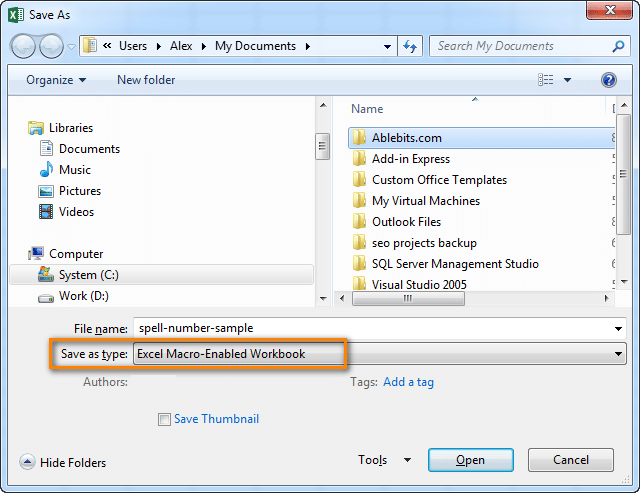
8: Choose the location. “Save as type” must be selected as “Excel macro-enabled workbook”.
SpellNumber Function for GBP (Great Britain Pound) has now been created in this workbook. It will only be available in this workbook.
To get this function in another workbook, follow the same steps and paste the code in another workbook.
Note: Whenever you will open any macro-enabled workbook, there will be Security Warning as shown below:

Select “Enable this content”.
Press Enter or Click “OK”.
If you don’t do this the code will not function.
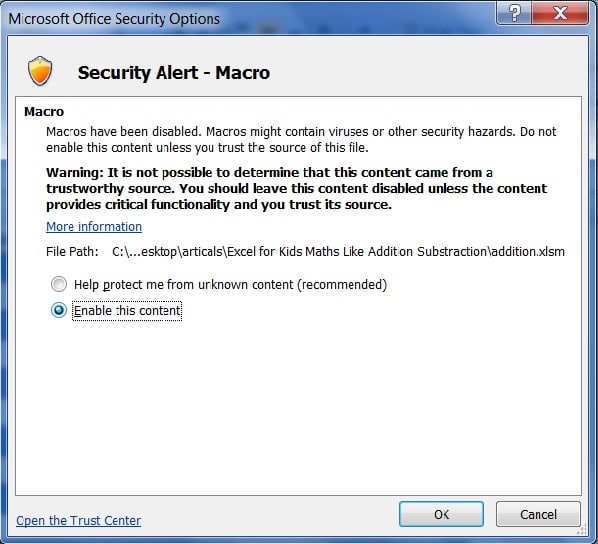
Let us check the function which we just created.
- Insert your numbers in Column A. In Column B, select the function SpellNumberEDP, provide the cell reference and the currency as the second parameter. See image below:
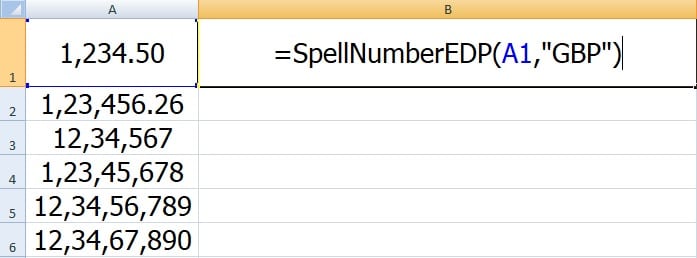
You can enter “GBP” in caps as well well as small. Either way, the result will be the same.
- Use Fill Handle, copy the same formula to Column B. It displays the numbers as shown below:
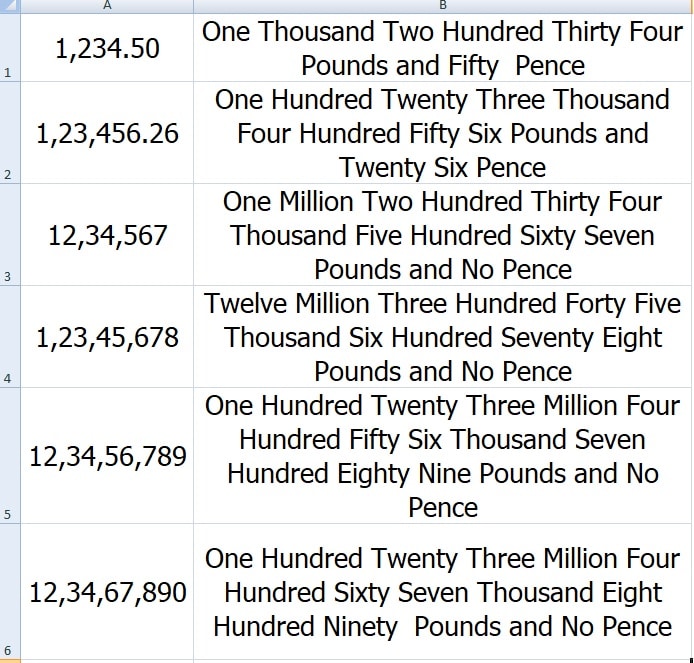
We thank our readers for liking, sharing and following us on different social media platforms.
If you have any queries or suggestions please share in the comment section below. I will be more than happy to assist you.